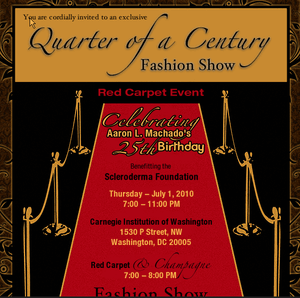
I recently posted an article on how to involve Millennials in your benefit auction. (It’s almost prerequisite reading for this post.) Today you get to see a Millennial in work, and — further bonus! – how it ties into a recent LinkedIn conversation I’ve been following.
Aaron is my virtual intern. After I spoke at a George Washington University event management function, he came up to me and said, “Don’t forget me. I’m going to be contacting you!”
And he did.
He’s been helping with some of my company’s social media outreach, videos, and one-off projects. He’s merging his event planning skills with fashion.
Perhaps it’s no surprise that given his interests and age, his 25th “Quarter of a Century” birthday is a huge bash to raise money for The Scleroderma Foundation.

Sherry Truhlar and intern Aaron
Look at what some of this 24-year-old has done in preparation:
- Secured the venue
- Bought insurance
- Reached out to many sponsors to cover food, drinks, hotel rooms, gifts, and more
- Designed a Website and tied the back-end to Paypal for processing
- Coordinated accommodations for his New York designer (whom he works with during New York Fashion Week)
- Oversaw marketing, signage, A/V, etc.
Given Aaron’s professional approach, you might be stuck for an answer on this next bit.
Recently a LinkedIn discussion launched by Michelle Bourassa, CFO of Lots of Fund in the Detroit area, asked members to give their thoughts on unsolicited fundraising events. She wrote:
Interesting article in this week’s Crain’s Detroit Business by Sherri Welch. It’s all about young professionals who have started sponsoring charitable events designed to attract younger donors. They’ve used Facebook and branded this type of fund raising as “Party with a Purpose.” While the events sited in the article have been successful, most are unsolicited.
The article quotes Gary Dembs, President of the Detroit Chapter, Association of Fundraising Professionals, who states “But from a professional standpoint, there is risk in third-party use of a brand name and how their mission is being portrayed.”
Dembs suggests that nonprofits can head off problems by making sure that they have third-party event guidelines in place about the use of their brands and by having staff at these events. It is also suggested that event organizers contact charities in advance to ensure that the event they are planning doesn’t hurt the charities it’s meant to help
One of the event organizers, Josephine Nicholas, is quote in the article as saying “Once you affiliate with a charity, you’re required to go with their unspoken rules. We’re not comfortable with that. We want to fundraise our own way.”
Michelle asked: Should charities become more flexible to allow these types of events in order to attract younger donors?
Opinions are split 50/50.
In Aarons’ case, he called The Scleroderma Foundation, explained what he wanted to do and why, and they lended him the use of the logo. The charity didn’t have any third-party fundraising guidelines, so Aaron had free reign.
He’s running this in a top-notch way so the charity should be nothing but excited. But I could imagine that in some cases, a fundraiser could go wrong.
Really wrong.
Someone might drink too much alcohol and end up dead. Or a less scrupulous organizer might neglect to tell attendees that “$0.01 of every $1.00 spent tonight is going to Charity XYZ (and the rest stays in my pocket).”
In such a case, the image of the charity could be tarnished in the process, even though the charity had nothing to do with the function — other than their name being used.
I know that if my company logo was being broadcast, I’d want to have some confidence in how it was being used.
I do not advocate charities drawing up a document filled with 20-page legalese, but it might be useful to provide a 1-pager of broad guidelines with helpful hints. Something like,
- “Sometimes venues require liability insurance. You might check into that because we won’t pay your bail bond.”
- “We really like the colors and shape of our logo. Though tempting, please don’t change it to work better with your event theme.”
- “Alcohol has an odd effect on people. If you’re serving it, follow local ordinances to avoid trouble.”
What do you think? Leave your comment below.
Thanks for the comment, Clair. I’ve got several posts on the blog that might help you get some ideas cooking:
https://www.redappleauctions.com/volunteers/how-to-turn-millennials-young-professionals-into-cutting-edge-auction-volunteers/
https://www.redappleauctions.com/audience-development/encouraging-youth-to-attend-your-gala/
https://www.redappleauctions.com/audience-development/what-to-do-when-your-fundraising-auction-guests-are-gen-x-or-gen-y/
Good luck!
We have a cause that is not all that appealing to young people – caring for the elderly. To make a broad generalization: they think old people are, at best, boring. Baby boomers and older “get it” because they’re dealing with their own aging parents. Any thoughts for engaging younger people?
I think it is important to partner with the charity that you want to support. Overall it is better for the cause in the long run.
I am presently doing a fundraiser for an organization called “Faces of Tomorrow”. When I contacted them they were so excited – they posted about the fundraiser on their website and even did an email drop to help support my efforts!
I like that you use the term “partner”, Kelly. I think approaching the event as a partnership between the organization and volunteer will always result in a win-win.
Best of luck to you on your fundraiser with “Faces of Tomorrow”.